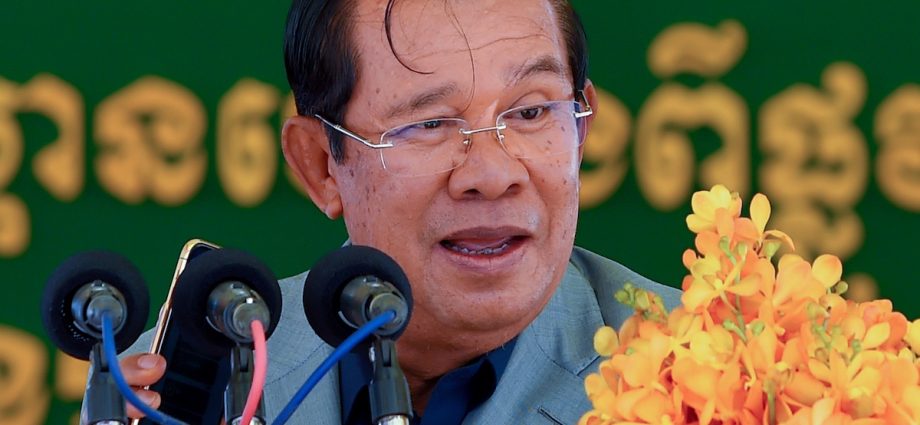At a mass rally on July 1, 2023, with campaigning underway for Cambodia’s upcoming general election, Prime Minister Hun Sen symbolically handed over the ruling Cambodian People’s Party (CPP) flag to his eldest son – Hun Manet – who is expected to soon succeed him as premier.
While Norodom Sihanouk is remembered as Cambodia’s “King Father”, Hun Sen will presumably want to go down as something akin to the “Prime Minister Father.”
As Hun Sen’s myth-making goes, he was the person who finally brought peace and stability to Cambodia, ending the country’s three-decade civil war in the 1990s. And he brought a measure of prosperity to Cambodia – a famine state when he took over.
Cambodia’s GDP per capita rose from US$247 in 1993 to $1,625 in 2021. He has also defended Cambodian sovereignty.
The degree to which Hun Sen, who has been in power since 1985, is solely responsible for these developments is debatable. But Cambodia has irrevocably changed for the better during his tenure.
The problem for the 45-year-old Hun Manet is that he will not be able to lay claim to any of those narratives. He will take over a country that is already peaceful and economically stable.
His is not a rags-to-riches story. He is a privileged princeling who was expensively educated in the West and then parachuted into the military and the ruling party. Some members of the CPP think he was forced upon the party as its next prime ministerial candidate.
Hun Sen’s merit comes from his hard graft and sacrifices — a “pagoda boy” who rose to the top. It is less evident what sacrifices Hun Manet has made for the country.
Nor can the future prime minister claim a “man of the soil” persona, which perhaps explains why he is running to be a lawmaker in Phnom Penh, not in the CPP’s rural heartland.

Attempts have been made to create a popular image for Hun Manet such as through hagiographic Khmer-language biographies. “Hun Manet: The First Son of Prime Minister On The Way to Succeed His Father”, written by Chhay Sophal, the Undersecretary of State at the Ministry of Information, was published in 2022.
Hun Manet said he would give away 10,000 copies of the book for free. “Influential Eldest Son” was another piece of flummery published in 2022.
As these titles suggest, Hun Manet, once prime minister, will have to live off his father’s image. His core legitimating factor will be that he was his father’s trusted successor.
That will make it difficult for Hun Sen to have a quiet profile after resigning. He is expected to maintain considerable power behind the scenes, especially as he will remain CPP president. But his lingering presence will stymie Hun Manet’s myth-making.
Yet, we can already see a narrative forming around Hun Manet that isn’t dynastic. He burnishes his image as a brotherly figure to the masses, not the fatherly role that Hun Sen has played. His speeches are less lecturing and paternal.
He has the most Facebook followers of any ruling party official other than his father, a way for him to communicate directly with the masses, bypassing the party’s spokesmen and the Ministry of Information.
Hun Manet has been president of CPP Youth since 2020. A large part of his “meritorious” persona stems from his presidency of party-aligned charities – especially the Samdech Techo Voluntary Youth Doctor Association – which played a key role in Cambodia’s successful vaccination campaign during the Covid-19 pandemic.
Since 2019, he has assumed some of the everyday responsibilities of his father such as opening new schools, hospitals and pagodas. These events make him appear a benevolent benefactor of Cambodia’s tax-funded welfare system.
There have been attempts to laud his military prowess, although it is debatable how important he was in dampening Cambodia–Thailand tensions in 2008, for instance.
Hun Manet will have to create credibility for himself on the world stage. As a military chief, he has traveled widely. He has met Chinese President Xi Jinping at least twice in Beijing. Hun Sen has never appeared comfortable away from home. Hun Manet – who speaks English – should be a more natural presence on the world stage.
He was entrusted with the task of wooing Cambodia’s notoriously anti-CPP diaspora in the United States, France and Australia. It waits to be seen whether a Hun Manet administration engages in the rapprochement with the West that Phnom Penh claims it has been attempting for years.
He was recently a guest of honor at an American Chamber of Commerce Gala Charity Dinner in Phnom Penh – an event his father would never attend nowadays.

Hun Manet will try to claim legitimacy from competency. His administration will work to perfect and fine-tune policies it inherits from the older generation – the “founding fathers” of the CPP and the Kingdom of Cambodia. The sons of other party grandees will also rise up through the ranks alongside Hun Manet as part of a “generational succession.”
He will not engage in maverick policies and will have to conduct a style of consensus decision-making in cabinet because the bureaucracy and civil service will not trust his instincts.
Whereas Hun Sen intervenes in the most minute government policy, Hun Manet will not be able to dictate from on high. The bureaucracy will have to become more self-sufficient. Ministers and secretaries of state will have to be more competent technocrats, not simply loyalists and enforcers of Hun Sen’s whims.
David Hutt is Research Fellow at the Central European Institute of Asian Studies.
This article was originally published by East Asia Forum and is republished under a Creative Commons license.

